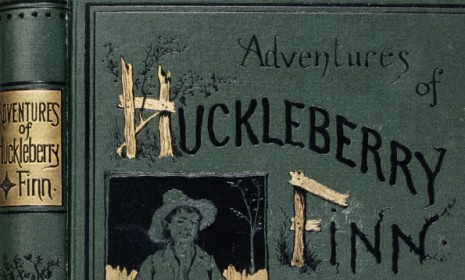Does the N-word belong in 'Huck Finn'?
NewSouth Books is publishing a version of Mark Twain's classic novel, minus an offensive racial epithet. Will that improve — or weaken — the book's value?

A free daily email with the biggest news stories of the day – and the best features from TheWeek.com
You are now subscribed
Your newsletter sign-up was successful
A plan to release new editions of Mark Twain's The Adventures of Tom Sawyer and Adventures of Huckleberry Finn in which the word "nigger" has been replaced with "slave" (and "injun" with "Indian") has triggered "a firestorm of criticism." The "N-word" appears 219 times in Huck Finn, and so offends many readers that it makes it impossible for them to appreciate the book, says Auburn University English professor Alan Gribben, a noted Twain scholar who's collaborating on the new editions with NewSouth Books. Is this excessive censorship, or merely a sensitive attempt to make Twain more palatable to a wider audience?
Censoring Huck Finn is a mistake: The way Huckleberry Finn "captures, in a beautiful and heart-rending story, the racial hatred and poison that marred America's early days" is what makes it a classic, says Steffani Cameron in Books on the Radio. Censoring the language dilutes the significance of the "biracial friendship" between Huck and Jim, a slave trying to reach a free state. The "soul-crushing, race-dividing epithet" gives educators an opportunity to discuss with students "how powerful" words can be.
"Whitewashing the past doesn't erase slavery"
The Week
Escape your echo chamber. Get the facts behind the news, plus analysis from multiple perspectives.

Sign up for The Week's Free Newsletters
From our morning news briefing to a weekly Good News Newsletter, get the best of The Week delivered directly to your inbox.
From our morning news briefing to a weekly Good News Newsletter, get the best of The Week delivered directly to your inbox.
It's more important to keep the book in classrooms: "I'm not big on censorship," says Dave Rosenthal in The Baltimore Sun. But let's face it: "This word is so weighted" and offensive that it is keeping Twain's classics out of classrooms in many schools. If removing a "politically incorrect word" makes the books more suitable for impressionable 21st-century readers, so be it. Teachers who assign the books can always "explain the self-censorship," which will keep the "tough prose" from being "completely whitewashed."
"Huckleberry Finn gets self-censored, loses 'n word'"
Huck Finn should reflect Twain's time, not ours: "Mark Twain didn't live in today's frighteningly over-the-top, PC world," says K.C. Morgan in Gear Live. We can't, and we shouldn't, "erase all reminders that this era ever existed." Huck Finn's world is a valuable "reminder of where we’ve been. Sometimes, it's ugly." But that doesn't mean we should forget, even if reading about it "makes people uncomfortable."
"Twain's Huck Finn the target of censorship — Yes, again"
A free daily email with the biggest news stories of the day – and the best features from TheWeek.com
-
 The week’s best photos
The week’s best photosIn Pictures An explosive meal, a carnival of joy, and more
-
 The ‘ravenous’ demand for Cornish minerals
The ‘ravenous’ demand for Cornish mineralsUnder the Radar Growing need for critical minerals to power tech has intensified ‘appetite’ for lithium, which could be a ‘huge boon’ for local economy
-
 Why are election experts taking Trump’s midterm threats seriously?
Why are election experts taking Trump’s midterm threats seriously?IN THE SPOTLIGHT As the president muses about polling place deployments and a centralized electoral system aimed at one-party control, lawmakers are taking this administration at its word